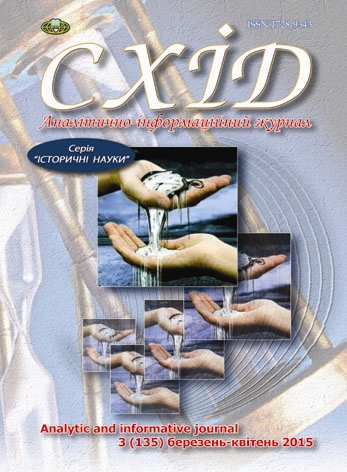Modern historical science: methodological aspect
DOI:
https://doi.org/10.21847/1728-9343.2015.3(135).45854Keywords:
historical research methodology, methodological principle, scientific methodAbstract
The paper reviews and analyzes methodological principles and methods of current historical studies. From the author's perspective, history as a science is organically connected with the life of society and should reflect events and facts of the past in a realistic and unbiased manner. The vision of the past is directly governed by the historical situation. As a consequence, with the perspective changed and the 'datum' shifted, history takes a different interpretation underpinned with new evaluation of historical events, phenomena and processes. Concurrently, such rethinking covers the entire historical process, which is directly preceded by changes in the methodology of historical learning and theoretical justification for renewal of the arsenal of historical studies. According to the author, the most topical methods for modern historical research are general scientific methods of analysis and synthesis, induction and deduction, the retrospective and historical comparative methods as well as such methods as statistic, historical genetic, hermeneutic, historical biographical, linguistic etc. It is the author's opinion that among up-dated methodological principles to be adhered to by historians the weightiest are those of historicism and consistency of research, objectivity, omnitude and pluralism.
Downloads
References
Collingwood R. (1996), The idea of history, Osnovy, Kyiv, p. 61 (ukr).
Gurevich A. Y. (1993), Historical synthesis and the "Annales school", Moscow, p. 33 (rus).
Stepin V. O., Analysis of the source base and methodology, р. 484 (rus).
Potulnytskyi V. A. (2000), Ukrainskyi istorychnyi zhurnal, № 1, pp. 1-17 (ukr).
Reient O. P. (1998), Nauka ta naukoznavstvo, № 2, pp. 42-52 (ukr).
Anikeyev A. A. (1997), Novaya i noveyshaya istoriya, № 2, pp. 168-173 (rus).
Downloads
Published
How to Cite
Issue
Section
License
Copyright (c) 2015 Volodymyr Kravchenko

This work is licensed under a Creative Commons Attribution-NonCommercial-NoDerivatives 4.0 International License.
1. Authors bear responsibility for the accuracy of facts, quotations, numbers and names used.
2. Manuscripts are not sent back.
3. The publisher does not always agree with the authors' opinion.
4. The authors reserve the right to authorship of the work and pass the first publication right of this work to the journal under the terms of a Creative Commons Attribution-NonCommercial-NoDerivatives 4.0 International License. This license allows others to distribute (copy) the published work for non-commercial purposes, provided there is mandatory attribution to its authors and a link to the first publication in our journal.
5. The authors have the right to conclude separate supplement agreements that relate to non-exclusive work distribution in the form in which it has been published by the journal (for example, to upload the work to the online storage of the journal or publish it as part of a monograph), provided that the reference to the first publication of the work in this journal is included.

